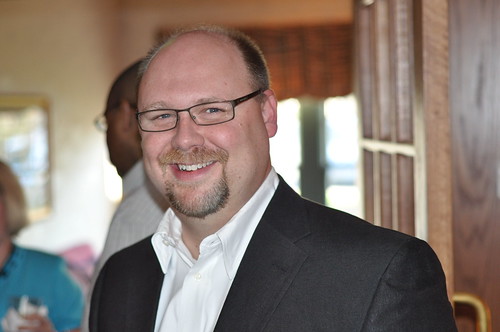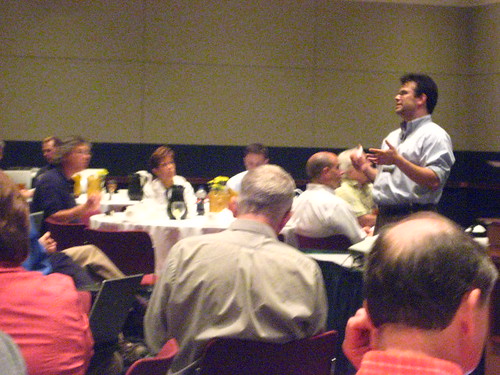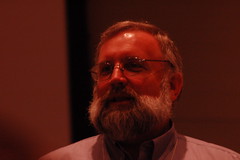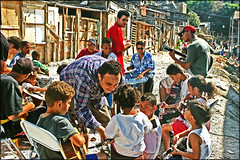 |
|
|
Cole Comprese is director of instructional technology at Penn State. His address is entitled, “If this is scholarship, then We’re all Doomed.” It seems that the phrase was used to describe one of his previous presentations.
To start, Camplese introduces his children. His daughter, the older, was born in the world of the mouse. His son was born in the world of touch. The younger Camplese is constantly running his fingers along the screen of their Mac, expecting to see things happen.
Showing a picture of a college (or high school) student’s desk, strewn with computers, camera lenses, and other gadgetry stuff, Cole exclaims that, “in my time, we looked this stuff up.” It’s an interesting distinction between institutional technology and personal technology. Tis worth noting that according to one of the un-conference sessions I attended here, students are not allowed to take their laptops home, under the Classrooms For the Future initiative.
Asked what they want from us, Penn State students reply. “I want to be able to do what what I can do out there.” 40% of students come to Penn State without a TV. This doesn’t seem that extraordinary to me, since when I was in college, very few of us had our own TV. There was only on on my floor. Of course, the first TV I owned, after college, was a black and white. Of course, they are watching their entertainment on their computer, through the Internet, “On Demand.”
A quarter of the students surveyed spend at least five hours on Facebook a week. They think it might be more time, but five hours was the highest number they included as an option.
Camplese said that, “What’s about to happen is Twitter.” I think he was surprised when he asked how many in the audience used Twitter and clearly more than half of the hands went up. He continued that as instructors teach in their lecture halls, they sees the backs of laptops, and students behind them engaged in conversations. He exclaims, “We need to drag the conversation to the front of the room.“
On some date (which I didn’t jot down) in 2007, the amount of video watched on the web exceeded that watched on TV. It is encouraging that 33% of facuty at Penn State reported using YouTube in their classrooms. Of course most of it was in the same way that we showed film strips in my time. The next step is to assign students to produce YouTube videos, and engage conversation about them.
At one point, Camplese started channeling Lawerenc Lessig, talking about the failure of copyright to keep up with the changing nature of information and about Creative Commons. He shows a number of mash-ups, which I’d not seen. It makes a powerful point. My line is that I played with my culture by fashioning sticks and scrap lumber together into toys that I could pretend with. My children play with their culture by remixing content.
Penn State is moving pretty massively to blogging because of the instructional benefits and the instructors’ ability to manage and assess their students’ work. Interestingly, all students at Penn State get 5Gb to server space. Only a quarter of the students use it. The rest are publishing in the cloud. About 10,000 students at Penn State blogging through the the universities services.
Camplese told a very interesting story about their Governor’s School inviting speakers to come and talk to the high school attendees, a select group of scholars. One of the speakers was chief of cyber-security from the FBI. It appears that he gave his canned “be-very-afraid” speech, during which the students, who are encouraged to backchannel the address, bruttally criticized his assumptions and conclusions. It may not be a surprise that he was able to capture all of their blog posts and Tweets and read everyone. ..and commented on every one. ..and acknowledging their points of view, and yielded in many cases to the logic of their conclusions.
In the end, the students were so impressed that they insisted that the FBI chief be invited to present the final address, and, according to Complese, “it was stunning.”
This statement rang especially true, given some conversation I was a part of earlier in the conference about ePortfolios. Cole said that, “Portfolios do not come at the end. They are a part of an ongoing conversation.
Cole closed with this statement, that “Digital expression is a form of scholarship and it must be systematically supported.”
Camplese, during the Q&A, said thatt he’s seen a HUGE increase in faculty use of technology in teaching. He says that there are three reasons…
- Tech is easier?
- We’re all using it anyway?
- The students demand it?
An excellent keynote address that I would happly sit through again.

Powered by ScribeFire.





 Sitting now at Chris Lehmann’s keynote about school 2.0. Why does it matter? He’s showing pictures of his children, and we all care about his children and all of he children. He worries that school is going to beat the love of learning from his children, that they are going to say, here, site, fold your hands, and listen and follow instructions. “Our children need us to be better than we are.”
Sitting now at Chris Lehmann’s keynote about school 2.0. Why does it matter? He’s showing pictures of his children, and we all care about his children and all of he children. He worries that school is going to beat the love of learning from his children, that they are going to say, here, site, fold your hands, and listen and follow instructions. “Our children need us to be better than we are.”
 First, the Penn Stater is a conference center and hotel on (or near) the campus of Pennsylvania State University. I’ve been here a number of times and can vouch for the chocolate cake they serve at all banquets.
First, the Penn Stater is a conference center and hotel on (or near) the campus of Pennsylvania State University. I’ve been here a number of times and can vouch for the chocolate cake they serve at all banquets. 








 I leave today for an eight-day tour that has me in Richmond, Lynchburg, suburban Boston, New York, and those are the ones I remember. What’s remarkable is that I do not get on a plane until the last day. Cars, trains, cabs, subways — I love it.
I leave today for an eight-day tour that has me in Richmond, Lynchburg, suburban Boston, New York, and those are the ones I remember. What’s remarkable is that I do not get on a plane until the last day. Cars, trains, cabs, subways — I love it.